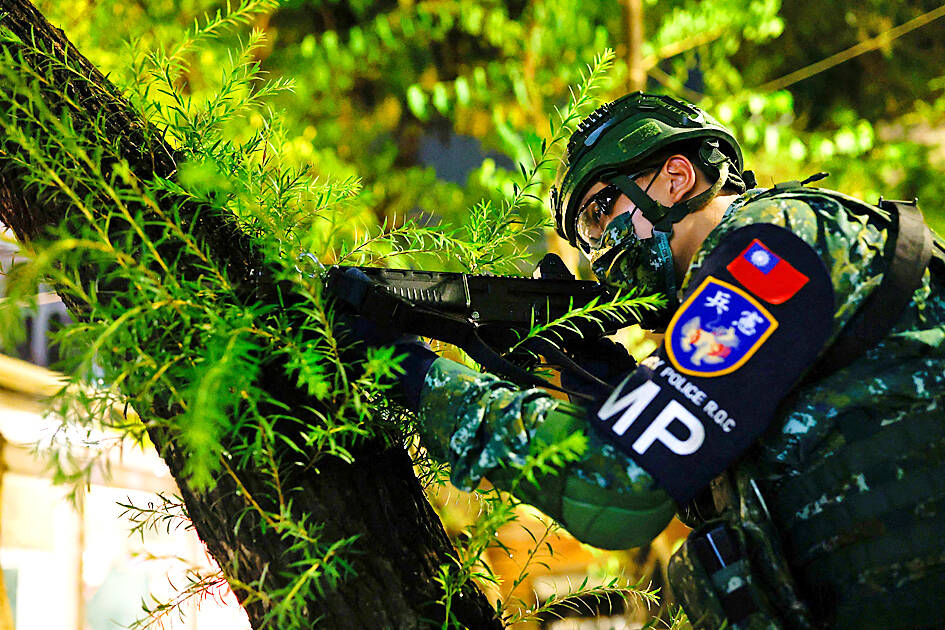The Ministry of National Defense (MND) is to raise its budget for military interactions linked to the US to NT$154 million (US$4.83 million) for fiscal 2024, up 28.7 percent from NT$120 billion a year earlier and a sign of deepening exchanges between the two nations’ armed forces.
The ministry’s proposed general budget, which was presented to the Legislative Yuan on Thursday includes housing technical staff, and said that while some of the activities would involve joint events, all of them would be conducted with the US.
The budget report said the ministry’s interactions with the US would include visits by personnel and military studies as part of regular exchanges, but also activities linked to new endeavors.

Photo: Ann Wang, Reuters
Taiwanese defense personnel are expected to attend conferences connected to the procurement of US arms and host US technical support personnel for the M1A2T Abrahams, High Mobility Artillery Rocket Systems and other weapons systems, the budget report said.
The new endeavors would include a deal to buy engines for the army’s M60A3 tanks and conferences about the TOW anti-tank guided missile, third-generation army command and control systems and Joint Direct Attack Munitions, it said.
A meeting between senior non-commissioned officers in the armed forces and the US Indo-Pacific Command is also in the works, the budget said.
Taiwan would be required to send personnel to US arms manufacturers for technical reasons, which contributed to the rise in costs, it said.
In related developments, National Defense University is to boost its scholarship program for students serving in foreign militaries, and the university’s president is to lead delegations on visits to the militaries of the nation’s diplomatic allies.
The president of the university is in the coming years expected to visit the war colleges and defense establishments of diplomatic allies in the Americas, Europe, Asia and Africa, a defense official said, speaking on condition of anonymity.
Taiwan’s diplomatic allies in the Americas would be the first on the list, with visits being planned for November next year, they said.
Previously, President Tsai Ing-wen (蔡英文) has said during a meeting with Latin American military officers attending the defense university that the government is interested in deepening its partnerships with Belize, Guatemala, Paraguay, Argentina, Chile and Peru.
The ministry has increasingly become bolder in conducting exchanges with friendly states in high-profile and semi-official settings due to international shifts that have allayed the government’s concerns about a backlash from Beijing, the official said.

SECURITY: As China is ‘reshaping’ Hong Kong’s population, Taiwan must raise the eligibility threshold for applications from Hong Kongers, Chiu Chui-cheng said When Hong Kong and Macau citizens apply for residency in Taiwan, it would be under a new category that includes a “national security observation period,” Mainland Affairs Council (MAC) Minister Chiu Chui-cheng (邱垂正) said yesterday. President William Lai (賴清德) on March 13 announced 17 strategies to counter China’s aggression toward Taiwan, including incorporating national security considerations into the review process for residency applications from Hong Kong and Macau citizens. The situation in Hong Kong is constantly changing, Chiu said to media yesterday on the sidelines of the Taipei Technology Run hosted by the Taipei Neihu Technology Park Development Association. With

CARROT AND STICK: While unrelenting in its military threats, China attracted nearly 40,000 Taiwanese to over 400 business events last year Nearly 40,000 Taiwanese last year joined industry events in China, such as conferences and trade fairs, supported by the Chinese government, a study showed yesterday, as Beijing ramps up a charm offensive toward Taipei alongside military pressure. China has long taken a carrot-and-stick approach to Taiwan, threatening it with the prospect of military action while reaching out to those it believes are amenable to Beijing’s point of view. Taiwanese security officials are wary of what they see as Beijing’s influence campaigns to sway public opinion after Taipei and Beijing gradually resumed travel links halted by the COVID-19 pandemic, but the scale of

A US Marine Corps regiment equipped with Naval Strike Missiles (NSM) is set to participate in the upcoming Balikatan 25 exercise in the Luzon Strait, marking the system’s first-ever deployment in the Philippines. US and Philippine officials have separately confirmed that the Navy Marine Expeditionary Ship Interdiction System (NMESIS) — the mobile launch platform for the Naval Strike Missile — would take part in the joint exercise. The missiles are being deployed to “a strategic first island chain chokepoint” in the waters between Taiwan proper and the Philippines, US-based Naval News reported. “The Luzon Strait and Bashi Channel represent a critical access

Pope Francis is be laid to rest on Saturday after lying in state for three days in St Peter’s Basilica, where the faithful are expected to flock to pay their respects to history’s first Latin American pontiff. The cardinals met yesterday in the Vatican’s synod hall to chart the next steps before a conclave begins to choose Francis’ successor, as condolences poured in from around the world. According to current norms, the conclave must begin between May 5 and 10. The cardinals set the funeral for Saturday at 10am in St Peter’s Square, to be celebrated by the dean of the College